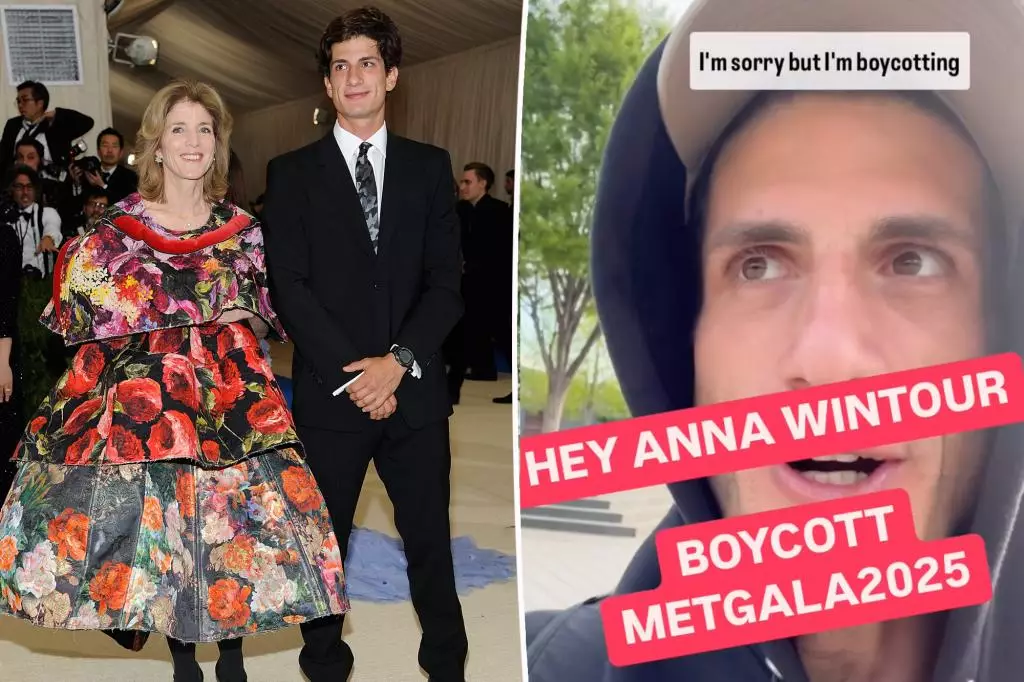In the world of high fashion and celebrity extravagance, the Met Gala stands as a monumental event akin to the Oscars of the fashion industry. Jack Schlossberg, the charismatic grandson of President John F. Kennedy, recently made headlines by announcing his intention to boycott this year’s event. With claims that the gala is out of touch with pressing global issues, Schlossberg’s tirade reflects a deeper concern regarding the dissonance between celebrity culture and serious socio-political realities. It seems this young Kennedy scion, who has often leveraged his lineage for visibility, is now attempting to turn that visibility into a platform for change.
Rather than being an invited guest at the gala, a fact revealed by sources close to the event, Schlossberg has taken to social media to express his grievances. His rants echo a longing for authenticity in an industry often criticized for being superficial and disconnected from the challenges that many face. “With so much happening at home and around the world, it’s not the time for a party like that,” he stated in a post that served both as a declaration and a self-promotional tool. His absence—whether voluntary or enforced—is another layer to his narrative of boycotting an event that, to him, has lost its relevance in the face of real-world issues.
Fashion’s Intricate Web of Access and Influence
Schlossberg’s claims of a boycott gain complexity when one considers the inherent exclusivity of the Met Gala. As reported, an invite to this prestigious event is often a reflection of one’s relationship with major fashion houses or designers rather than individual merit. This critique of the invitation process hints at a broader conversation about who gets to enter the hall of fame in the fashion world and who remains on the periphery. Given that Schlossberg’s previous attendance was as his mother’s plus one, it raises questions about the merits of familial lineage in accessing spaces designed for cultural influencers.
Furthermore, Schlossberg’s comments on Vogue, his former employer, touch upon a critical issue that plagues not just fashion but all forms of media—corporate interests stifling authentic voices and progressive dialogue. His pointed question, “Why is Vogue so quiet?” suggests a call for action within a publication that wields considerable power in shaping public discourse. His discontent with Vogue and its editorial policies mirrors a frustration felt by many who seek accountability from leading cultural platforms. It seems that Schlossberg is not merely interested in boycotting but is also pushing for a re-examination of the narratives that fashion media chooses to amplify.
The Clash of Ideals and Brand Image
As Schlossberg leveraged his social media presence to rant and rave about his perceived injustices from the fashion elite, he painted himself as both a critic and a creator. His plans to launch an informative project on his own news channel signal a desire to carve a niche for himself outside the polished facade of high society. This duality is not uncommon among public figures who navigate the thin line between celebrity influence and social justice activism.
In promoting his own project, Schlossberg is strategically using the Met Gala as a launchpad for visibility. His activism feels almost performative at times, aimed at generating buzz in a culture obsessed with notoriety and personal branding. While his points regarding fashion and politics are certainly worth consideration, one cannot help but wonder if his actions are motivated by a desire for relevance rather than altruism. He may be calling for action, but making noise without an authentic commitment can often cheapen the message.
Fashion’s Political Footprint
The theme of this year’s Met Gala, “Superfine: Tailoring Black Style,” positions fashion not only as an aesthetic pursuit but as a dialogue on cultural identity and political expression. Schlossberg’s articulation of “fashion is political” resonates well in this context, challenging the industry to uphold its responsibility to address pressing social matters instead of merely creating spectacle. His vocal opposition to the gala stirs an important conversation about the moral responsibilities of fashion entities, pushing for a future where they embrace their potential as powerful agents of change rather than remain complacent in their celebrations of grandeur.
The upcoming event will feature an impressive lineup of celebrities and industry leaders who will showcase the transformative power of fashion. However, Schlossberg’s absence, either by choice or circumstance, serves as a reminder of the ongoing struggle for integrity in an industry riddled with contradictions. It might not lead to tumultuous change overnight, but it certainly puts a spotlight on the intersection of fashion and humanity, urging all involved to reflect on their roles in influencing not just what we wear, but how we engage with the world around us.

